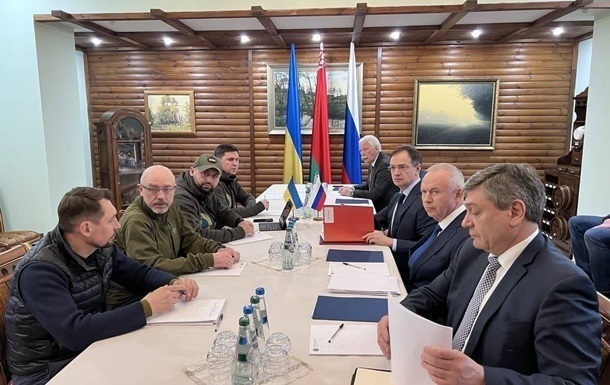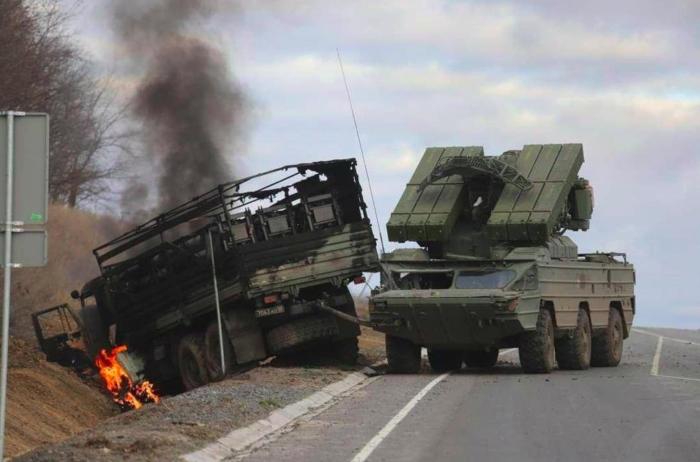Russia has made several demands to allow a peaceful resolution of its war in Ukraine. Before considering the individual demand, it is crucial to remember that Russia from the start has no rights in Ukraine whatsoever. Any concessions to its demands are, therefore, an infringement on Ukrainian sovereignty and its fundamental right to choose its own security arrangement. Any call for compromise is the same.
Giving in to Russia means giving in to armed aggression at the cost of international law. We most not at least bear in mind that Russia has justified the war itself through lies. The war is in fact built on lies only.
That’s not to say that Ukraine should not seek a peaceful resolution to the war.
I am only arguing that irrespective of how small or big the concession might be, international law has been weakened if armed aggression succeeds in forcing Ukraine to give up any of its sovereign rights.
Vladimir Medinsky, the head of the Russian negotiating delegation, said the goal of Russia in these negotiations is the same today as when the war started at the very beginning of the “special military operation.”
To understand what those really are, we need to return to 2014. We need to remember that President Putin for years has argued that Ukraine is not a sovereign country, and his demands for a federalization of the country (to ensure Russian ability to veto any internal or foreign policy decisions in conflict with its interests).
Russia is demanding Ukraine:
- be neutral and not become a NATO member
- disarm to ensure it is not a threat to Russia
- not host foreign military bases in its territory
- recognize Crimea as Russian
- recognize the independence of two newly formed proxy mini-states in Donbas
- protect the Russian language in Ukraine, and
- de-Nazification.
1. Neutrality
In the article “Threat of democracy. The real security concerns behind Russia’s lies about NATO” I argued that
“Russia knows that NATO does not pose a threat. If that were the case, it would never have challenged the alliance’s integrity. To the extent that NATO is a “problem,” it is because it stands in the way of Russia’s great power’s ambitions to occupy more neighbouring states. NATO is preventing this.
The real threat is what the alliance represents and what membership entails. Russia is not facing a military threat, but the ‘threat of democracy. Free nations based on universal rights, democratic principles, and common values. All of which is in direct conflict with the Russian world and its authoritarian rule. It is this — or the possibility that the Russians will want the same — that threatens the Russian elite.“
If liberal democracy is the real threat to Russia, neutrality does not stop democracy from growing and spreading. When the war started in 2014, Ukraine was neutral. NATO membership was not on the table. Demanding what was the status when the war started, does not bear promises of peace.
2. Demilitarization
In the article “Is Ukraine’s reformed military ready to repel a new Russian invasion?” we highlighted that at
“the onset of war in 2014 exposed Ukraine as completely unprepared. The Armed Forces of Ukraine (AFU) were not manned, equipped, or trained to meet Russian aggression. Ukraine was neither psychologically nor legally prepared for hybrid war. Its logistic stockpiles were, with the exception of weapons and ammunition mostly from the Soviet period, non-existent. At the beginning of the war, there was virtually no budget. The command and control system was not suited to combat activities.
Even though the military has been prioritized for the last seven years, it has been impossible to overcome decades of neglect. The UAF therefore still has several enduring strategic vulnerabilities […] There are gaps in key operational and combat capabilities, namely Navy, Air Defence, and Tactical Aviation.”
Ukraine was in essence demilitarized already when Russia chose to attack in 2014. The presence capabilities are a consequence of its aggressions. Despite tremendous efforts to close the critical vulnerabilities (in the face of lack of Western support), it still failed to deter the further escalation of the war. The demilitarization of Ukraine will, therefore, not bring enduring peace.
3. Foreign military bases
The argument that NATO bases in Ukraine would threaten Russia is no less illogical than any of the above-mentioned demands.
In its “ultimatum” to the USA and NATO on 16 December 2021, Russia wished to “
regulate NATOs force posture in all countries which joined the Alliance after 1997 (Albania, Bulgaria, Croatia, the Czech Republic, Estonia, Hungary, Latvia, Lithuania, Montenegro, North Macedonia, Poland, Romania, Slovakia, and Slovenia). Having started wars in Europe, Russia wants to limit the Alliance’s ability to forward deploy units in response to its aggressive foreign policy.”
Russia also demanded the
“USA refrain from flying heavy bombers or deploying surface warships, including in the framework of the Alliance, in areas “where they can attack targets in the territory” of Russia, they call on NATO in principle to refrain from operating in the Black Sea, the Baltic Sea, the Barents Sea and the Arctic, as well as the airspace over Northern, Central and Eastern Europe.”
Following the Russian “irrationality,” the Alliance would still be able to (if they so wished …) threaten Russia from anywhere it desired. The flying time of a cruise missile from any of the Baltic countries to Moscow is no longer than from Ukraine.
If NATO does not, as I claim, constitute a military threat to Russia, foreign bases on Ukrainian territory do not threaten Russia. They would protect Ukraine from being attacked by Russia.
Demanding the opportunity to forward deploy NATO forces to deter Russian aggressions does not bring hope for peaceful coexistence.
4. Recognition of Crimea as Russian
For the last 8 years, Russia has stated that the issue about Crimea is not open for negotiations. It is off the table. Period.
Any concessions from Ukraine would mean that the international sanctions imposed as a response to Russia’s illegal occupation and annexation of the peninsular will be lifted.
Additionally, it would run contrary to both the will of the Ukrainian population and international law. Armed aggression must not be allowed to succeed. Any concessions to the contrary would, therefore, only bring promises of further Russian aggression.
5. Recognition of the independence of DNR and LNR
This follows the same argument as the previous point. Any concessions to the contrary would, therefore, only bring promises of further Russian aggression.
6. Protection of the Russian language in Ukraine.
The demand is based on one of the many Russian disinformation narratives. The promotion of the Ukrainian language is a natural consequence of an evolving democracy. The overwhelming majority
, 72%, of Ukrainian citizens are confident that the Ukrainian language is an important attribute of Ukraine's independence. Most Ukrainian believe that the rights of Russian speakers are not being violated. Only 26% believe that the rights of Russian speakers are violated in some cases (including 40% in the East), and 10% speak of constant violations (21% in the East).
Diversified views are a healthy sign of any democracy. As such, it is important to remember that Russia has no rights whatsoever to impose its language on a sovereign and independent country. Making the demands demonstrates its intention to uphold its pressure on Ukraine in the years to come.
7. De-Nazification
The demand for “de-Nazification” is just another of Russia’s horrific narratives without any root in reality. The right-wing political force is smaller than any of the EU member states. It is just a horrible lie, again demonstrating Russia’s distorted worldview. And that – the distorted world view – will not disappear after a hypothetical peace agreement.
After more than 8 years of Russian unprovoked and unjustifiable war against its neighbor, the head of the Russian delegation makes the following mind-blowing comment:
“We need a peaceful, free, independent Ukraine, neutral -- not a member of military blocs, not a member of NATO. A country that is our friend, a neighbor, with whom we are developing relations together, building our future, and which is not a base for military and economic attacks against our country."
After 8 years of war, the statement is probably the best indication of Russian sincerity. He is, in essence, referring to President Putin “manifest” from last year in which he wrote:
“I am confident that true sovereignty of Ukraine is possible only in partnership with Russia. Our spiritual, human and civilizational ties formed for centuries and have their origins in the same sources, they have been hardened by common trials, achievements and victories. Our kinship has been transmitted from generation to generation. It is in the hearts and the memory of people living in modern Russia and Ukraine, in the blood ties that unite millions of our families. Together we have always been and will be many times stronger and more successful. For we are one people.”
Unless the West are truly committed, I fear that no other “security guarantee” will be worth the paper it is written on.
The West's reluctance to engage actively in the defense of Ukraine (not an attack on Russia) demonstrates that the only security guarantee that will work is NATO article 5.
Related:
- Putin has started “solving the Ukrainian question”
- Western policies of appeasement produced a monster… again
- Over 80% of Ukrainians want to return occupied Crimea and Donbas; 72% in support of joining NATO – poll




